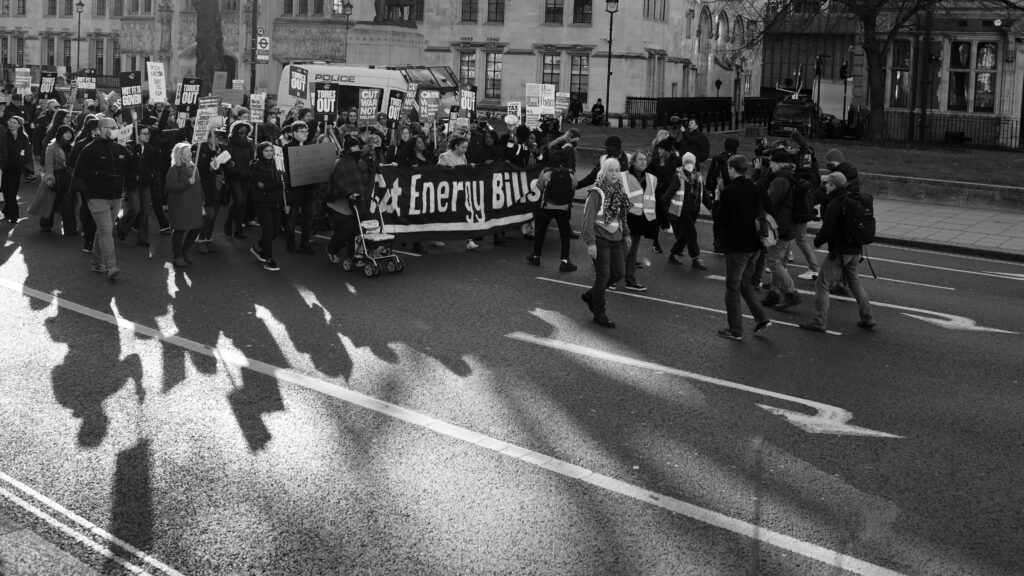
Canva
What will it take to solve UK’s energy crisis?
The Energy Price Guarantee is not enough, the UK needs long-term policy change. We speak to experts about possible solutions.
DiyoraShadijanova and Editors
17 Oct 2022
The UK’s energy crisis is creating a domino effect of rising costs on almost all aspects of our lives.
This October, average household energy bills were meant to rise to £3,549 per year, in line with increasing wholesale energy prices. Next year, they were predicted to be as high as £7,700. Instead, October’s 80% price cap increase set by the Office of Gas and Electricity Markets (Ofgem) was cancelled and an Energy Price Guarantee was instead introduced by the government, now only to last until April. With the added £400 flat reduction for all homes this winter, these short-term bursts of financial relief mean that on average, UK households will pay £2,100 for energy bills this year. But once the Price Guarantee is up, average bills are projected to hit £4,347 after Jeremy Hunt’s U-turn over Liz Truss’ policy.
The current discounted prices, however, are still double what they were in October 2020. Millions have been pushed into fuel poverty, with Black and minority ethnic groups being twice as likely to be in deep poverty. There have been warnings of controlled three-hour blackouts to save energy. And the only solution the Conservative government has implemented is subsidising energy company profits by taking money out of the public purse and paying for the Energy Price Guarantee.
The wholesale price of energy is going up worldwide, so it’s not entirely a UK-specific problem. However, our households have been the hardest hit in Europe.
While the EU agrees on a windfall tax (a one-off tax imposed by a government on a company that gained sudden profits) of £123bn to help lower consumer bills and fund Europe’s green transition, Liz Truss has ruled out extending the meagre £5bn windfall tax introduced by Rishi Sunak earlier this year – despite pleas from Shell’s own CEO.
Our energy model is failing. People may freeze to death this winter, but the country’s energy producers will be swimming in record profits.
So, what will it take to solve the UK’s energy crisis? gal-dem speaks to experts to find out.
Problem: Energy suppliers are using profits to pay off shareholders instead of footing the costs of extortionate surges in price
In the 1980s, the energy market was fragmented by Thatchers’ mass privatisations. This put three sectors under separate, private ownership: producers of energy, retailers who sell energy and distributors of energy (like the National Grid). It was argued that privatisation would bring competition and lower prices, but clearly, this didn’t happen. In the UK, energy prices have risen eight times faster than average earnings since 2010, while the energy companies have collected record profits.
There are many reasons why energy privatisation ends up being more costly for the majority of people. The most important in this crisis is that profits are not reinvested into making improvements in the businesses – such as increasing efficiency or ensuring a green transition. Instead, they are paid out to shareholders and corporate executives. This is because in the privatisation model, dividends must be paid to shareholders, not reinvested in better services. Privatisation also breeds poor transparency and weak accountability and when energy companies fail or raise prices, it is governments and inevitably taxpayers’ money that either bails them out or absorbs these shocks.
“Our energy model is failing”
Why – when privatisation has clearly failed for the masses and even 62% of Conservative voters want energy to run in the public sector – won’t the current government renationalise the energy industry? “It is a bit ironic that Liz Truss comes in as the most rightwing prime minister since the Second World War with all this free market ideology and on day one spends £150bn,” says Simon Pirani, a writer, historian and researcher of energy. “This Tory government in particular hate the idea of nationalisation. Their whole ideology is that the market can solve all these problems.”
Renationalising would essentially be admitting defeat, that the free-market ideology is responsible for the mess we’re in and that we need radical political change. This would mean disrupting the status quo and moving towards socialism. Since Thatcher, neoliberalism has gripped the nation and politicians have won elections with it.
But what also can’t be underestimated is the lobbying power of the fossil fuel industry. “[It has] lobbied relentlessly for decades to generate the conditions that it has in the UK, until the windfall tax was introduced in May, made the UK the most profitable country in the world for offshore oil and gas projects,” says Tessa Khan, an environmental lawyer and director of Uplift. “Companies like Shell and BP have paid negative tax in recent years and that’s because they created – through their aggressive lobbying and the lobbying of their proxies – one of the most generous tax regimes in the world for the oil and gas industry.”
Solution: If energy suppliers were nationalised, they would be better regulated and we wouldn’t have to pay out shareholders. This money could be used to drop the price of energy or reinvested for a green transition
Nationalisation should be considered for several reasons, says Khan. “At the moment, there is a significant amount of excess profit that’s being experienced and enjoyed by those companies. If you’re publicly owned, that curbs the amount of profiteering that happens. It also means that it’s easier to regulate the industry, because you don’t just have very powerful private companies who can get together and run rings around the regulator.”
How would nationalisation be achieved in the UK? There are a number of approaches, which the Labour Party already addressed in 2019. A recent TUC report calculated the cost of nationalising the ‘Big 5’ energy retailers as £2.8bn, which would buy all of the companies’ shares. When you consider that it cost the UK government £2.7bn on bailing 28 energy companies in June 2021, it seems like a no-brainer to bring the energy sector under public ownership. “The big energy retail companies made £23bn in dividends between 2010 and 2020 according to Common Wealth, and £43bn if you include share buy-backs,” Andrew Fisher wrote in Open Democracy earlier this year. “What you choose to do with that surplus in public ownership is another matter: you could use it to invest in new clean energy or to lower bills or fund staff pay rises, rather than subject your workers to fire-and-rehire practices as British Gas did last year.”
Campaigning groups like We Own It have also drawn out their own plan to explain how it could be done. They suggest turning Bulb (which has collapsed) into a publicly owned energy supplier, nationalising the existing energy supply and retail companies, introducing a permanent windfall tax on international oil and gas companies, setting up a new state-owned renewable energy company to tackle the climate crisis and bring the privatised monopolies of the National Grid and regional distributors into public ownership.
“The UK has one of the most generous tax regimes in the world for the oil and gas industry”
Problem: Energy is currently treated as a commodity, but its price is highly volatile due to changes in demand and because it’s difficult to store
“A part of the problem is that both gas and electricity are provided to people not as a service,” says Pirani. “There’s no company, whether state owned or not, that sorts out all the problems of getting the necessary fuel or electricity to your home and charges you a small amount for that.” Instead, energy is provided as a commodity – something that can be bought or sold – and the prices of all commodities go up and down. According to the IEA, energy prices are especially volatile to price changes because consumers generally can’t substitute other fuels when the price of say, natural gas, fluctuates. Doing so is often physically impossible and not financially viable.
Solution: If energy companies were nationalised, energy could then be provided as a service
Whether energy is seen as a commodity or a service is a vital factor in how the sector is organised and regulated. Currently, when people pay energy bills to their energy providers, they are actually paying for the activities the energy allows them to partake in; whether that’s cooking, heating a home or using it to power electronics. If energy providers treated what they do as a service, their priority would be to ensure that they supply the energy needed to carry out these vital activities.
“There is a very strong argument in saying that actually, electricity isn’t like other commodities because it is very difficult to store it,” Pirani continues. “The advantage of nationalisation would be that you can then supply that electricity as a service. There’s a long history in the labour movement that argues for the provision of gas and electricity, and also water and sewage – the necessities of living in an urban setting in the modern world. So if the prices zigzag up and down like they’re doing at the moment, there’s no reason why the consumers at the end of the chain should have to foot the bill for that.”
Problem: Energy usage does need to come down
Global electricity demand is growing faster than renewable energy, which is placing a strong reliance on fossil fuels. In the UK alone, there is a projected 50% increase in electricity demand by 2035. It’s clear that reducing emissions will require bringing down usage. But what does that look like?
Solution: Ensure better energy efficiency and adapt large-scale systems instead of restricting individuals
“Talking about demand reduction is a total turnoff for the general public. There is immediately an image of environmentalists telling people’s grannies to use one room in the house when people are living in mansions or mums who drive their kids to school to simply stop driving,” says Pirani. Instead, he likes to refer to energy usage as ‘throughput’, because for him, it’s simply about reducing the amount of energy that we need to put through the pipes. Rather than restricting people from taking part in daily activities, it is about building energy-efficient systems. “If we have better urban transport, then most people wouldn’t think of driving their kids to school, and instead would use public transport, cycle or walk,” he adds.
A similar approach could be taken to address UK’s over-reliance on gas during cold winters. We have some of the leakiest houses in Europe – if we insulate our houses, we could save significant amounts of energy. “The government in the past has engaged in a proper effort to help insulate people’s homes, but it’s basically defunded those programmes over the last decade,” Khan explains. “In 2012, for example, there were two million energy efficiency measures that were installed in homes across the UK and that’s dropped dramatically in recent years. That’s because the government just doesn’t see that as a priority.” Other solutions to increasing energy efficiency require building better homes and retrofitting existing ones.
“The advantage of nationalisation would be that you can then supply that electricity as a service”
Problem: The green transition isn’t happening fast enough
Despite the UK getting nearly 30% of its energy from clean sources like wind, solar and hydropower, the country has defied climate warnings with as many 100 new oil and gas licenses awarded and 900 locations being offered for exploration. There is also an active anti-green lobby taking root in government, with ministers hoping to ban solar projects from most English farms and Truss pushing for fracking.
Nationalisation also doesn’t fully solve the fundamental problem of our dependency on the global oil and gas market. “In the UK, our reliance on fossil fuels is currently evident in two main ways: the first is we have a relatively high proportion of gas making up our electricity mix, compared to other countries, and also nearly 85% of households in the UK are reliant on gas heating,” Khan explains.
Solution: Pressure to see through a radical, green transition
“Johnson loved to give speeches about how the British were pioneering in green energy, when actually our efforts are pretty pathetic compared to Spain, Germany, Denmark and now China,” says Pirani. “There’s a healthy portion of it, but there’s nothing to write home about. What should be happening is a massive expansion of wind and solar power. It’s also important to build integrated systems, where we all have solar panels or windmills in our houses, and you have direct current systems locally, where communities increasingly are able to make their own electricity. Those are the sort of changes that have to happen long-term.” Investing in green sources of energy would help wean the country off fossil fuels and decrease polluters’ lobbying power.
The UK not only needs to heavily invest in green energy, but it also needs to adopt a radical policy that would deal with both class inequality and the climate crisis at the same time. A Green New Deal would offer this. For Green New Deal Rising, a climate justice campaign group, this looks like building an economy based on 100% clean energy, creating secure green jobs and ensuring a just transition for those currently working in the energy sector, transforming the overall economy, protecting habitats and carbon sinks and ensuring the provision of clean water, air and green spaces as well as promoting global justice to account for the UK’s historic and ongoing role in exploiting resources.
“The UK has some of the best renewable resources in Europe, so the government isn’t doing everything it could to make the most of that abundant, affordable clean energy we have access to,” Khan adds.
Problem: We need better renewable energy storage
There is evidence that renewable energy is being wasted in the UK because there aren’t enough long duration energy storage (LDES) systems. Such storage would again stabilise energy prices for the long term.
Solution: Invest in energy storage
In 2017, the UK’s biggest gas storage facility was closed. “Storage is a big issue, we need storage for whatever gases are on the system, but much more urgently in the 21st century, with climate change happening, we need storage for electricity.”
There are different ways of doing this. One way includes pumping water up a hill, putting it in a reservoir and then letting it go down the hill again, which would drive a dam or a waterwheel. Pirani again stresses the importance of integrated systems, where consumers are also producing their own energy through solar panels and windmills. “Energy storage is an important issue. But it is not an excuse for the bad policies that the government is implementing now.”
Find a list of resources for support here, and read more of our coverage of the cost of living crisis.
gal-dem updated this article on 21 October to reflect the news that the new Conservative chancellor, Jeremy Hunt announced that the government’s scheme to cap energy prices for two years, costing about £80bn, would be universal only up to April, being targeted after that at poorer households.
The contribution of our members is crucial. Their support enables us to be proudly independent, challenge the whitewashed media landscape and most importantly, platform the work of marginalised communities. To continue this mission, we need to grow gal-dem to 6,000 members – and we can only do this with your support.
As a member you will enjoy exclusive access to our gal-dem Discord channel and Culture Club, live chats with our editors, skill shares, discounts, events, newsletters and more! Support our community and become a member today from as little as £4.99 a month.

Britain’s policing was built on racism. Abolition is unavoidable

How Pakistan’s Khwaja Sira and transgender communities are fearing and fighting for their futures

Their anti-rape performance went viral globally. Now what?






